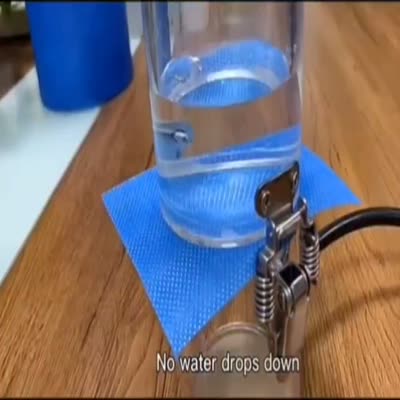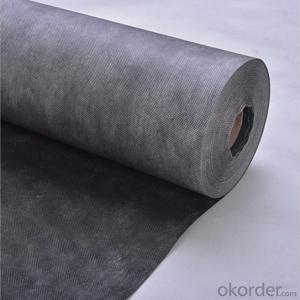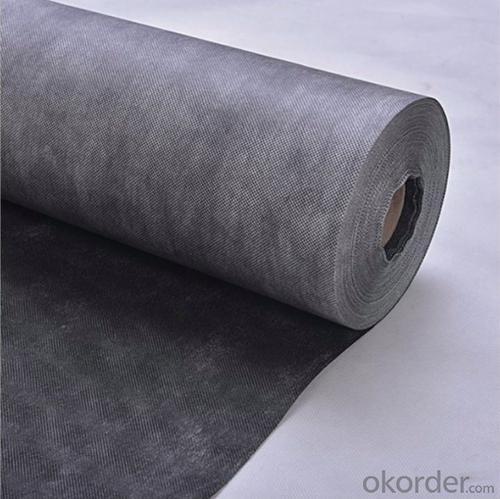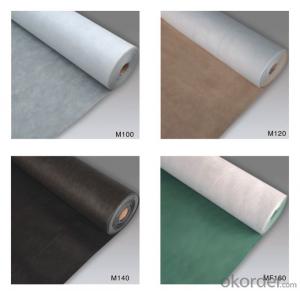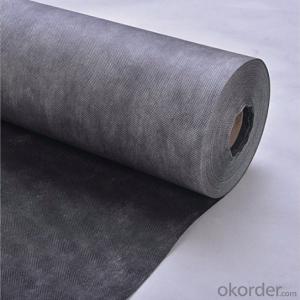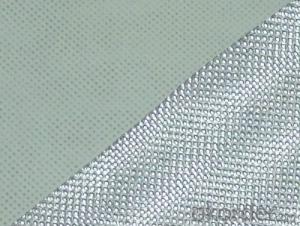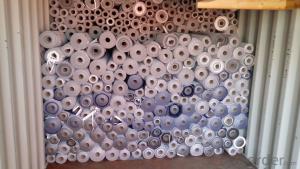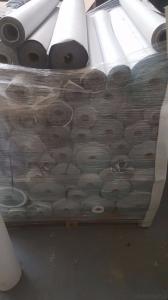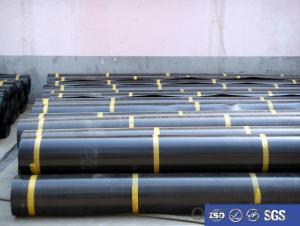Waterproof breathable pp woven mesh fabric membrane synthetic flat roofing underlayment
- Loading Port:
- SHANGHAI
- Payment Terms:
- TT OR LC
- Min Order Qty:
- 500 m²
- Supply Capability:
- 100000 m²/month
OKorder Service Pledge
OKorder Financial Service
You Might Also Like
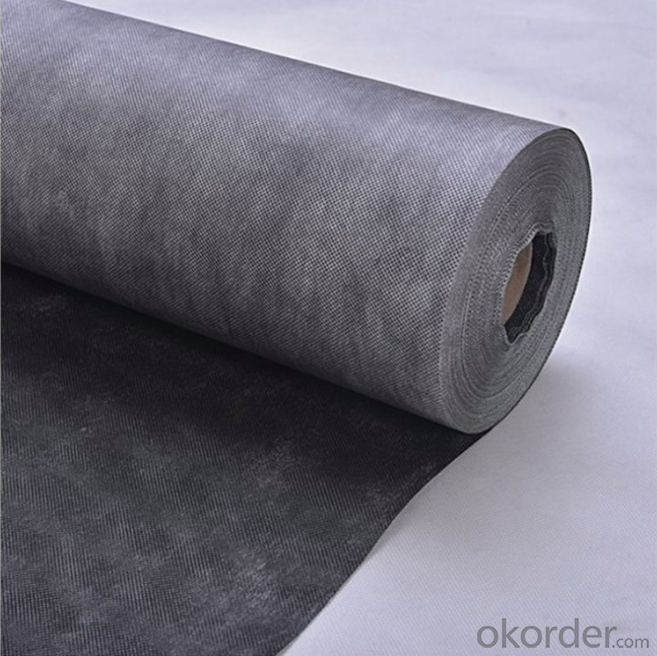
Product Feature:
Air open & vapour permeable
More breathable than any other 'air open' underlay on the market
Lowest vapour resistance of all breathable membranes
Being both air open & vapour permeable further minimises the risk of condensation forming
No ventilation required
Strong 3 layer material
Superior nail tear strength
| Mass per unit area: | 140g/m2 |
| Product Type: | Waterproofing Breathable Bembrane For House Wrapping |
| Material: | PP/PE granule |
| Tensile Strength(MD/XD): | 190N/5cm(+-20%)/150N/5cm(+-20%) |
| Resistance to tearing(MD/XD): | >50N/50N |
| Flexibility at low temperature: | (-)24°C |
| Resistance to water pentration: | W1 |
| Temperature resistance | (+)70°C |
| Resistance to UV | 3momths |
| Loading quantity | 40' HC ---2000rolls |
Our company :
our company is a leading professional manufacturer in China, which locates in Yangzhou State-grade Development Zone,Yangzhou City, Jiangsu Province, nearby Shanghai.
We have advanced production lines with the technology from Italy and Germany, which are applied to nonwoven products, film lamination, roofing materials, disposable medical products, packaging materials and so on.Main products:Nonwoven fabric , SMS, SMMS and manufactured productsFilm or foil laminated products Roofing membrane, flooring underlayPE woven fabric, PE tarpaulin, vapor barrierGreenhouseWe not only have first-class processing line, but have first-grade quality management. We have been qualified by ISO9001 (quality) and CE, this system can supply active way to guarantee the quality. We have exported to many countries, such as Canada, USA, Chile, Argentina, New Zealand, Australia, Malaysia, Japan, Ukraine, Latvia, Slovenia, Slovakia, Spain, CZ, Russia, Croatia, Bulgaria, Romania, Italy, UK, Germany, Greece and so on. With a group of excellent senior management and hi-tech R& D personnel and our skilled workers, we can supply you the goods with competitive prices and better quality. We look forward to establish friendly and long term relationship with you in the near future.
FAQ:
1. who are we?
We are based in Jiangsu, China, start from 2008,sell to Eastern Europe(18.00%),Southern Europe(15.00%),Northern Europe(15.00%),Western Europe(12.00%),South Asia(6.00%),Eastern Asia(5.00%),Oceania(5.00%),Central America(5.00%),Southeast Asia(5.00%),North America(3.00%),South America(3.00%),Africa(3.00%),Domestic Market(3.00%),Mid East(2.00%). There are total about 11-50 people in our office.
2. how can we guarantee quality?
Always a pre-production sample before mass production;
Always final Inspection before shipment;
3.what can you buy from us?
Breathable Membrane, Reflection Breathable Membrane, Housewrap, Vapor Barrier, Heat Insulation Film
4. why should you buy from us not from other suppliers?
We not only have first-class processing line, but have first-grade quality management. We have been qualified by ISO9001 (quality) and CE, this system can supply active way to guarantee the quality. We have exported to many countries, such as Canada, USA,
5. what services can we provide?
Accepted Delivery Terms: FOB,CFR,CIF,EXW;
Accepted Payment Currency:USD,EUR,JPY,CAD,HKD,CNY;
Accepted Payment Type: T/T,L/C,Credit Card,PayPal,Western Union,Cash;
- Q: Can a waterproofing membrane be used on tunnels with soundproofing systems?
- Yes, a waterproofing membrane can be used on tunnels with soundproofing systems. Waterproofing membranes are designed to prevent the penetration of water into structures, while soundproofing systems are designed to minimize the transmission of sound. These two systems serve different purposes and can be used together in tunnels to ensure both water protection and sound insulation.
- Q: Can a waterproofing membrane be used on retaining walls?
- Using a waterproofing membrane on retaining walls is possible. Retaining walls often face moisture and hydrostatic pressure, which can result in water infiltration and structural decay. By applying a waterproofing membrane to the retaining wall, water penetration can be prevented, shielding the wall from moisture-related harm and extending its lifespan. The membrane acts as a barrier, stopping water from seeping into the wall and causing problems like efflorescence, cracks, or erosion. It is crucial to select a waterproofing membrane that is designed specifically for below-grade applications and can withstand the pressure exerted by the soil being retained. Moreover, proper installation techniques and suitable drainage systems should be taken into account to ensure the effectiveness of the waterproofing membrane on retaining walls.
- Q: Can waterproofing membranes be used in cold climates?
- Yes, waterproofing membranes can be used in cold climates. They are designed to withstand extreme temperatures, including freezing conditions, and provide effective protection against water penetration.
- Q: Can a waterproofing membrane be used on concrete?
- Yes, a waterproofing membrane can be used on concrete. In fact, it is a commonly used method to prevent water penetration and protect concrete structures from moisture damage. A waterproofing membrane is a thin layer of material that is applied on the surface of the concrete to create a barrier against water and moisture. It can be made from various materials such as bitumen, rubberized asphalt, polyurethane, or acrylic. The membrane is typically applied in liquid or sheet form and adheres to the concrete surface to form a continuous and impermeable coating. This coating prevents water from seeping into the concrete, which can cause degradation, cracks, and other forms of damage. Waterproofing membranes are widely used in various concrete applications, including basements, foundations, roofs, and other structures that are exposed to moisture or water.
- Q: Are there any specific maintenance requirements for a waterproofing membrane?
- Yes, there are specific maintenance requirements for a waterproofing membrane. Regular inspections should be conducted to check for any signs of damage or deterioration, such as cracks or leaks. Any debris or standing water should be promptly removed to prevent potential damage. Additionally, it is important to follow the manufacturer's guidelines for cleaning and maintenance, which may include periodic cleaning with mild detergents and avoiding the use of harsh chemicals or abrasive cleaning tools.
- Q: Can a waterproofing membrane be used on terraces or patios?
- Yes, a waterproofing membrane can be used on terraces or patios to prevent water penetration and protect the underlying structure from moisture damage.
- Q: Can a waterproofing membrane be used for parking garages?
- Parking garages require the use of a waterproofing membrane. This membrane serves as a protective layer that is applied to surfaces in order to prevent water penetration. Effective waterproofing is necessary in parking garages to safeguard the structure from water damage, such as corrosion of steel reinforcement and deterioration of concrete. Parking garages are exposed to various sources of water, such as rain, snow, and vehicle fluids, which can seep through cracks and joints. By acting as a barrier, a waterproofing membrane prevents water from infiltrating the structure and causing harm. There are different types of waterproofing membranes available for parking garages, including sheet membranes, liquid-applied membranes, and cementitious coatings. These membranes can be used on horizontal and vertical surfaces, such as floors, walls, and ramps, to create a seal that is impervious to water. When selecting a waterproofing membrane for a parking garage, it is important to consider factors such as durability, flexibility, and resistance to chemicals. The membrane should be able to withstand the heavy loads and traffic conditions commonly found in parking garages. In conclusion, the use of a waterproofing membrane in parking garages is essential for protecting the structure and prolonging its lifespan by preventing water-related damage. It helps to maintain the garage's structural integrity and appearance, while also ensuring a safe and functional environment for users.
- Q: Can a waterproofing membrane be used on tunnels with electrical installations?
- Yes, a waterproofing membrane can be used on tunnels with electrical installations. The primary purpose of a waterproofing membrane is to prevent water infiltration and protect the underlying structures from moisture damage. In tunnels with electrical installations, it is crucial to ensure that the electrical equipment and wiring are protected from water damage to ensure the safe and efficient operation of the installations. By applying a waterproofing membrane to the tunnel walls and ceilings, any potential water ingress can be effectively prevented, reducing the risk of damage to the electrical installations. However, it is important to consult with professionals experienced in tunnel waterproofing to ensure that the chosen membrane is suitable for the specific requirements of the tunnel and electrical installations, considering factors such as fire resistance, electrical insulation, and durability.
- Q: Can a waterproofing membrane be used for a hotel swimming pool area?
- Yes, a waterproofing membrane can be used for a hotel swimming pool area. A waterproofing membrane is a specially designed material that is applied to surfaces to prevent water penetration. It forms a protective barrier that prevents water from seeping into the underlying structure, protecting it from damage caused by water exposure. In the case of a hotel swimming pool area, a waterproofing membrane can be applied to the pool shell and surrounding areas to prevent water from leaking into the building or surrounding structures. This helps to maintain the integrity of the pool area and prevent any potential water damage. Additionally, a waterproofing membrane can also help to prevent the growth of mold and mildew, as it creates a moisture barrier. Therefore, using a waterproofing membrane for a hotel swimming pool area is a wise choice to ensure the longevity and durability of the pool and surrounding structures.
- Q: Are waterproofing membranes resistant to hydrostatic pressure?
- Waterproofing membranes have been specifically developed to resist hydrostatic pressure, which is the pressure exerted by still water. When a building is exposed to ground water, such as in basements or foundations, hydrostatic pressure becomes a significant concern as it can lead to water seeping through walls and floors. To prevent water from penetrating the building structure, waterproofing membranes are engineered to withstand and resist the pressure exerted by water. These membranes are typically made from materials like bitumen, rubberized asphalt, or synthetic polymers, all of which possess excellent water resistance properties. Moreover, the purpose of waterproofing membranes is to create an uninterrupted barrier against water, effectively preventing any potential leaks or seepage. They are applied in multiple layers, ensuring a sturdy and long-lasting barrier that can withstand the high pressure of water. It is crucial to note that the effectiveness of the waterproofing membrane in resisting hydrostatic pressure may vary depending on its type and quality. Hence, it is essential to choose a high-quality membrane and ensure proper installation to maximize its ability to resist hydrostatic pressure.
Send your message to us
Waterproof breathable pp woven mesh fabric membrane synthetic flat roofing underlayment
- Loading Port:
- SHANGHAI
- Payment Terms:
- TT OR LC
- Min Order Qty:
- 500 m²
- Supply Capability:
- 100000 m²/month
OKorder Service Pledge
OKorder Financial Service
Similar products
Hot products
Hot Searches
Related keywords
